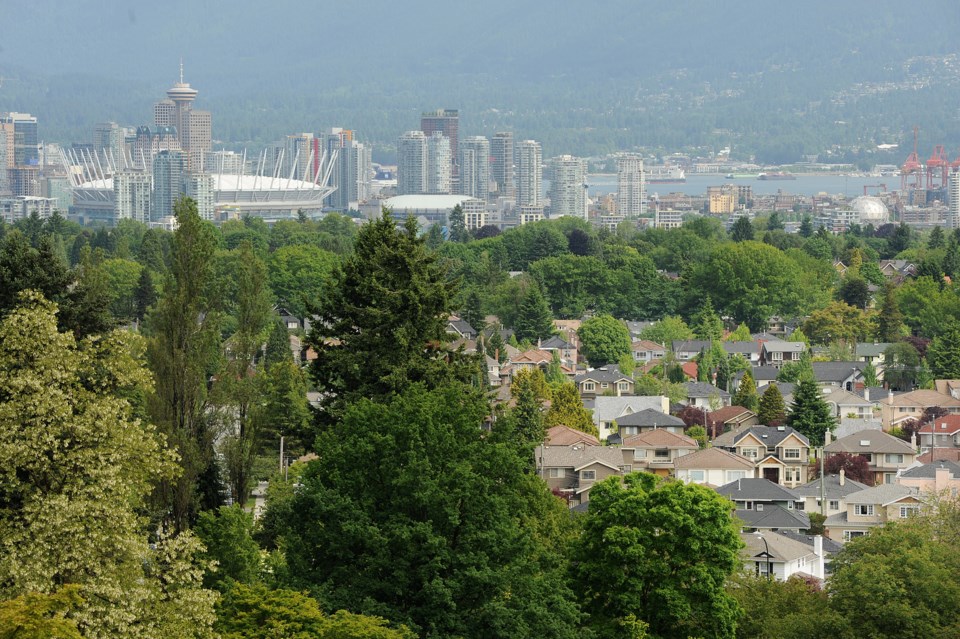âI'm pretty happy.â That was UBC Sauder School of Business professor Tom Davidoffâs reaction to the NDP's budget announcements on housing Tuesday.
The governmentâs includes an increase to the foreign buyersâ tax from 15 per cent to 20 per cent and expanding it to areas outside of Metro Vancouver; a $6.2 billion investment in affordable housing units; a new speculation tax; an increase in the property transfer tax on homes valued at more than $3 million; and an increase on the school tax rate on homes valued at more than $3 million.
âMy basic test was you shouldnât be able to buy a $4-million house and pay less than $20,000 in income and property taxes to British Columbia. Because your property tax in Â鶹´«Ã½Ó³»is going to be something like $12,000 on that, which is a ridiculous joke,â Davidoff told the Courier Feb. 20. âB.C. should be a place where the tax code makes it hard to buy property but easy to make a living. Weâve been the opposite so theyâre moving in the right direction.â
Davidoff called the provincial governmentâs plan to introduce, in the fall of 2018, a new speculation tax on residential property a âreally good idea.â It will target both foreign and domestic speculators who own residential property in B.C. but donât pay taxes here and it will apply to Metro Vancouver, the Fraser Valley, Capital and Nanaimo regional districts and Kelowna and West Kelowna. The tax rate will be 0.5 per cent of taxable assessed value for the 2018 tax year and two per cent thereafter.
Davidoff also supports the move to charge a higher transfer tax rate on higher value properties. The rate will increase from three to five per cent on the fair market that is over $3 million on residential properties.
âI would have just gone with a higher annual property tax, but five per cent on $3 million-plus homes is totally appropriate and a good idea. Generally, anything they do to shift the tax burden overall from making a living to owning property is a great idea, especially around Vancouver,â he said.
The one item the budget missed, according to Davidoff, relates to the fact that municipal governments are sitting on a lot of land value with municipal zoning. He thinks the province should encourage municipalities to auction it off.
âTo say, hey, if you want to build some apartments in residential neighbourhoods, you can do it, but youâve got to buy a permit for cash,â he said. âThere are billions of dollars the municipal government could make doing that and the province should have clear rules, but that can be for another day,â he said. âI think in terms of the tax burden, they came pretty darn close to implementing exactly what 50 professors told them to implement [in ], and what they ran on. Theyâre clearly taking affordability seriously and it looks like they get the basic idea that low property taxes and an ability not to pay income tax⦠is an invitation to unaffordability.â
Whether housing affordability will be measurably different five years down the road remains to be seen, but Davidoff points out lower income residents living in cheaper housing have been hit the hardest in terms of rent and property price increases over the past few years.
âThatâs really dangerous. Itâs natural to presume these measures may be more concentrated at the top and upper middle of the market, so people struggling with affordably, especially who donât have the where with all to buy a house, are likely to continue to struggle,â he said. âI donât think this is going to solve our rental problem overnight but it may put a lot of units on the market. We donât know. An Airbnb unit may now have to go on the market because I think it would be subject to this surcharge because you donât have a full time tenant.â
So does Davidoff expect to be reading any more goodbye letters from Vancouverites fleeing the city because they canât afford rent or home prices?
âThe people writing [goodbye] letters will be the people buying vacation homes here and thatâs great. Goodbye, see you later, come back and stay in a hotel,â he said.
The Urban Development Institute, meanwhile, isnât as happy with the budget. It praises the governmentâs plans for significant investment in new housing, but itâs âextremely concerned new and far reaching housing tax increases will not have a positive impact on affordability.â
âThese half billion in alarming, new real estate taxes also target local buyers and homeowners. Unfortunately, todayâs budget did not address the real problem of getting new housing approved and built. CMHC identified the âweakâ supply response in Â鶹´«Ã½Ó³»as a critical driver of housing affordability issues in the region,â UDI president and CEO Anne McMullin said in a press release issued Feb. 20. âIn many municipalities it can take four to five years to receive approvals, and two to three years to construct new buildings â that means we wonât see any relief from this new housing investment for more than seven years.â
Ìý°ª²Ô²¹´Ç¾±²ú³ó



